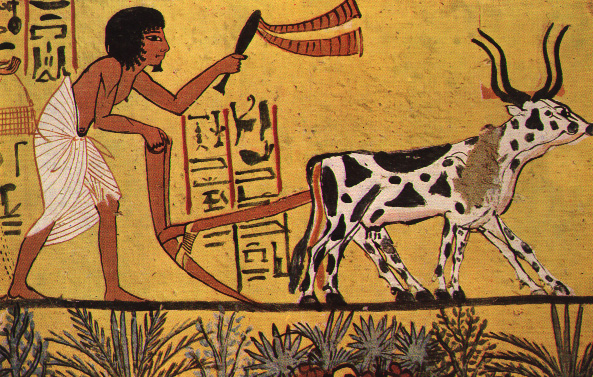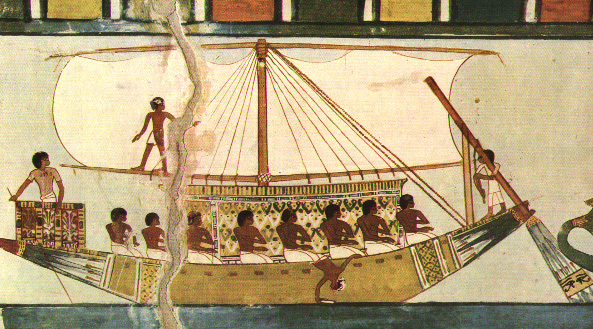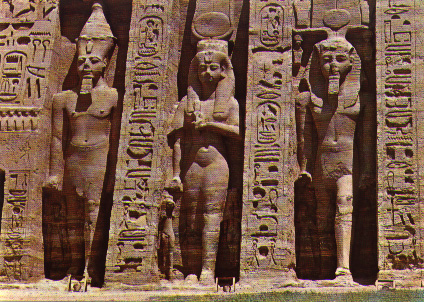ANTHRO
114 . . . . . . . . Fall 99

- T-TH 9:35-11:OO . .
. . .101 Heger
Prof. Daniel M.
Varisco
socdmv@hofstra.edu
Office: 216 Heger (3-5590)
Office Hours: Tues (4-5 pm )
Wed (9-11 am) or by appt.
Purpose of
Course
Required
Course Texts
Course
Schedule
Course
Requirements
Reading
the Assignments
Class
Attendance
Exams
Class
Assignment
Journal
(CAJ)
Critical
Analysis of
Reading
(CAR)
Reflective
Essay
Web
Critique
Extra
Credit Options
Grading

Purpose of
Course
This course will examine the rise of
civilization and beginnings of recorded history in the major Old
World centers of Egypt and Mesopotamia, the so-called "cradle of
civilization". The focus of the course will be on the ancient roots
of our civilized ideas: ideas about God, about civil society and law,
about death and afterlife, about heroes and warriors, about sex and
taxes, about ancient technology and the beginnings of science. Among
the issues examined will be the misuse of archaeological information
by the lunatic fringe. For more than a century archaeologists have
been uncovering the prehistory of our history. We will dust off a few
of the more interesting parts of this search into the past and look
at why we think we are civilized after all.
Required
Course Texts
• Frymer-Kensy, Tikva (1992) In the
Wake of the Goddess: Women, Culture and the Biblical Transformation
of Myth. NY: Fawcett Columbine.
• Montet, Pierre (1981) Everyday
Life in Ancient Egypt in the Days of Ramesses the Great.
Philadelphia: University of Pennsylvania Press.
• Saggs, H. W. F. (1989)
Civilization before Greece and Rome. New Haven: Yale
University Press.
• A114 Reader [This is available
only at Sir Speedy (794-1234) at 2039 Hempstead Turnpike , across
from Home Depot, east of campus.]

Course
Schedule
- 9/7 Introduction to objectives and
requirements of course.
-
- I. THE CRADLE OF
CIVILIZATION
-
- 9/9 The Beginnings of
Civilization
- READ:
Feder and Park
(1997:430-457.483-486) in A114 Reader
-
- 9/14 Who Was Who in the Cradle of
Civilization?
- READ:
Saggs, ch.1, pp. 1-20.
-
- 9/16 Ancient Egypt
- Film: "Egypt: Quest for
Eternity"
- READ:
Saggs, ch. 2, pp. 21-30 and Montet, pp. 1-30,
252-273
- CAR 1
due: Reading Montet
-
- 9/21 No class (Conversion
Day)
-
- 9/23 Daily Life in Ancient
Egypt
- READ:
Montet, pp. 45-132
-
- 9/28 The Pyramids
- READ:
Saggs, ch. 3, pp. 47-61, Mertz
(pp. 218-232) in A114 Reader
- Film: "This Old Pyramid"
(V-3764)
-
- 9/30 Mummies and Death in Ancient
Egypt
- READ:
Montet, ch. XII, 300-330;
Plutarch (pp. 29-32) in A114 Reader
- CAJ
1 due: Death in
Egypt
-
- 10/5 Pharaohs and Warfare
- READ:
Montet, chapters VIII-IX, pp.
192-251
-
- 10/7 Travel in the Ancient Near
East
- READ:
Montet, pp. 133-191 and "The Tale of Sinuhe" (pp. 21-53) in
A114 Reader
-
- 10/12 Exam #1
-
- II. THE LEGACY OF
THE ANCIENT NEAR EAST
-
- 10/14 Writing and the
Alphabet
- READ:
Saggs, chs. 4-5, pp. 62-113;
Rossini (1989:5-8, 10-26, 84-95)
-
- 10/19 The Legacy of
Mesopotamia
- Film: "Iraq: The Cradle of
Civilization" (V-1923)
-
- 10/21 Urban Life in Ancient
Mesopotamia
- READ:
Saggs, ch. 6, pp.
114-127
-
- 10/26 Law in the Ancient
World
- READ:
Saggs, chs. 8-9, pp. 156-175,
Kramer "The First Legal Precedent" (pp. 56-59) in "The Law Code
of Hammurabi" (pp. 27-35) A114 Reader
- CAJ 2
due: Ancient Justice
-
- 10/28 Warfare and the
State
- READ:
Saggs, ch. 9, pp. 176-194
-
- 11/2 Trade and Natural
Resources
- READ:
Saggs, chs. 7 (pp. 128-155)
and 10 (pp. 195-219)
- CAR
2 due: Reading
Saggs
-
- 11/4 The Arts and Sciences
- READ:
Saggs, chs. 11-12, pp. 220-266
and Kramer "Schooldays..." (pp. 8-11) in A114
Reader
-
- 11/9 Exam #2
-
- III. THE
DOMESTICATION OF GOD AND WOMAN
-
- 11/11 Ancient Religion
- READ:
Saggs, ch. 13, pp.
267-290
-
- 11/18 Myth and the Old
Testament
- READ: Saggs, pp. 290-294,
Frymer-Kensky (pp. vii-13), Hoerth (pp. 16-22) and "Adapa"
(167- 172) in A114 Reader
-
- 11/23 The Epic of
Gilgamesh
- READ:
Sanders (pp. 20-42, 59-116 )
in A114 Reader
- CAJ
3 due: My Role in
Gilgamesh
-
- 11/30 Archaeology and Noah's
Flood
- READ:
Whitcomb and Morris (pp. xix-xxii, 65-79), Unger (pp. 55-71);
Bright (pp.32-40) and "The Destruction of Mankind" (81-82) in
A114 Reader
-
- 12/2 The Mother Goddess: A Feminist
Restructuring of the History of Religion
- READ:
Frymer-Kensky, pp. 14-31,
45-80, 221-224
-
- 12/7 Sexuality in the Ancient World
- READ:
Frymer-Kensky, 118-143,
153-167, 187-202
-
- 12/9 Pyramidiots, Chariots of the
Gods and Sunken Continents
- READ:
Feder (1996:1-10,
165-220)
-
- 12/14 • REFLECTIVE ESSAY DUE
in my office (216 Heger) TODAY by 3 PM
-
- 12/21 FINAL EXAM 10:30am-12:30pm
in 100 Heger

Course
Requirements
1. READING THE ASSIGNMENTS by the date noted
in the course schedule or as directed by the professor. It is is
important to read the assigned material before class so that you can
participate fully in class discussion and bring up questions or
explore issues you are not clear about. Bring the assigned text with
you to class on the relevant day.
2. CLASS ATTENDANCE. Attendance will be
taken each day at the start of class. [See attached sheet on
attendance policy.]
3. EXAMS: There will be three
short-answer/essay exams: each exam essay will be graded according to
the following criteria:
a. Demonstration that the
information is understood
b. Use of relevant and appropriate
information and examples from the course
c. Critical analysis of key
concepts and perspectives
d. Synthesis and reformulation in
your own words
e. Clarity , completeness and
coherence of response
Exams cannot be made up without advance
notice for a legitimate reason.
4. CLASS ASSIGNMENT JOURNAL (CAJ)
- Each student is required to write a
class journal assignment (CAJ) related to the assigned readings,
and topics. Each assignment should be about 2-3 pages (typed,
double-spaced) in length. The idea of the assignment is to show
how your interact with the material you are reading or seeing. You
must relate your ideas and opinions to the assigned reading or
topic. I will provide written comments to help you improve your
writing in an essay format so that you can do well on the three
essay exams.
-
- The grading for each CAJ is "outcome
based," which means that a particular assignment can be revised or
expanded as necessary to meet the established criteria for full
credit of 4 points per assignment, assuming the first is handed in
on time. I will substract one point if the assignment is not
handed in on the date due. All assignments must be revised no
later than the last official day (Dec. 9) of class, but I
recommend you do the revision immediately for benefit from my
comments. The criteria are:
- • a. Level of effort
(appropriate length and degree you interact with the
material)
- • b. Appropriate and relevant
examples
- • c. Coherent argument and
clear presentation of points
- • d. Assignment handed in on
time
-
- The following are the specific class
assignments for the CAJ:
- CAJ 1 (due 9/30) Death in Egypt.
Based on a careful reading of Montet's chapter on"The Rites of
Burial," pretend you are about to die and (hopefully) enter the
afterlife properly. Explain in your own words what you think about
death, how you expect to be judged in the afterlife, how you hope
your body will be prepared as a mummy and what you expect your
funeral to look like.
-
- CAJ 2 (due 10/26) Ancient Justice
. Based on your reading of the ancient law codes discussed by
Saggs and in the biblical laws of Deuteronomy , chapters 21-27,
give your impresions of ancient justice as defined in the
lawcodes. Is there a double standard in treatment of males and
females? Is there any evidence of ethnic or racial prejudice? What
kinds of prohibitions seem strange to you and why?
-
- CAJ 3 (due 11/23) Reading
Gilgamesh. After reading the epic of Gilgamesh, pick one character
(divine, human, or otherwise) and describe what interests you
about that character and how he/she would be able to function in
today's world. What does this character tell you about human
nature, even after all the centuries since the epic was written?
-
5. CRITICAL ANALYSIS OF READING
(CAR)
-
- Each student is required to complete a
critical analysis of reading (CAR) for two of the assigned days
readings. The purpose of this assignment is to improve the ability
to understand the reading through critical reading of the text. A
handout is provided for each CAR, a copy of which is also
available on the class website. I will provide written comments to
help you improve your study skills.
The grading for each CAR is "outcome
based," which means that a particular assignment can be revised or
expanded as necessary to meet the established criteria for full
credit of 4 points per assignment, assuming the first is handed in
on time. I will substract one point if the assignment is not
handed in on the date due. All assignments must be revised no
later than the last official day (Dec. 9) of class, but I
recommend you do the revision immediately for benefit from my
comments. These are:
- • a. Shows relative mastery of
the author's main points
• b. Shows relative mastery of
author's style of writing
• c. Ability to recognize
relevant examples
• d. Assignment handed in on time
CAR #1 (due 9/16) Critical Analysis of
Montet Reading.
CAR #2 (due 11/2) Critical Analysis of
Saggs Reading.
6. REFLECTIVE ESSAY
- Purpose: The purpose of this
essay is to creatively engage with the information learned in this
course. Please consult the handout "How the Write a Better Essay"
for ideas on how best to write your essay. This is not a term
paper and it is not meant to be an exercise in providing
descriptive details. The idea is toshow you can go beyond mere
repeititon of details and place them in a meaningful historical
narrative.
-
Details:
-
- Imagine that you are an
ancient Egyptian or an ancient Sumerian or Akkadian. You can be
either male or female (this time around you get to choose), king
or slave, moral pillar or crazed killer. The idea is to tell your
life story, including details based on your the course material.
Write the story in first-person. You should include some of the
following information: description of the place you were born,
description of your parents and their occupations, your family
life, your religious beliefs, your marriage and children, the
places you visited, the major accomplishments of your life, your
good fortune and bad luck, any brushes you had with the law (cite
a specific ancient law we studied), your fears and your hopes for
the future. You do not have to footnote references, but you need
to indicate the sources consulted at the end of your essay. You
are encouraged to use internet sources (on the class website) to
supplement the class material.
-
- Grading: This essay is worth 14
points. The major criteria (each is worth 2 points) I will use to
grade the essay are the following:
- a. demonstration that the information
presented is understood
- b. use of relevant and appropriate
examples from the course
- c. covers an adequate range of issues
- d. critical analysis of myth
- e. ability to synthesize rather than
merely repeat or describe
- f. clarity and coherent explanation
of points made
- g. originality and
creativity
-
- Length: 6-7 pages (typed,
double-spaced)
-
- Due Date: You may hand in a
draft copy for comments any time before Thanksgiving. The final
copy of your essay is due no later than Dec. 14 at 3 pm.. This
must be handed to me by hand. Do not simply leave it in my office
box. I will be in my office on Thursday afternoon between 1- 3 pm.
You are encouraged to hand in your essay on the last day of class.
Late papers will have 3 points automatically taken off. Remember
to attach the essay cover sheet handed out by the professor.
7. WEB CRITIQUE. Each student will
conduct a web search on religion according to the guidelines given at
the class website
(http://www.geocities.com/Athens/Oracle/9361/a114web).This
is due on the last official day of the class.
8. EXTRA CREDIT OPTIONS
- Each student in the class has an
opportunity to earn 6 extra-credit points. Each option you choose
is worth 3 points; you may choose up to two options. Attend the
event or do the written option and write up a 3 page discussion of
what you got out of it and how it relates to the course material.
I am not interested in a lot of descriptive information, but
rather your reflections on what were the important points and how
these relate to the class material and themes. All extra-credit
written assignments are due no later than the final exam in this
class.
-
- OPTIONS:
- • Visit the Near Eastern
collections in the Metropolitan Museum of Art or Brooklyn
Museum. This requires a 3-page written
assignment.
-
- • Critique of "Hollywood"
epic film on ancient Near East (ask professor for list).
This requires a 3-page written assignment.
-
- • Option you suggest and I
approve in advance. This could be a relevant outside
lecture, interview of someone of a different religion,
relevant documentary, etc. This requires a 3-page written
assignment.

Grading
Grading in this course is based on a 100
point scale (although the student has the opportunity to earn 103
points in the course). In general, the "A" range will extend from
90-100, the "B" range from 80-89, the "C" range from 70-79, the
D-range starting at 64. The point accumulation breaks down as
follows:
ITEM . . . . . . . . . . . . . . . . . . . .
. . . . . TOTAL POINTS
Exam # 1. . . . . . . . . . . . . . . . . .
. . . . . . . . . 20
Exam # 2. . . . . . . . . . . . . . . . . .
. . . . . . . . . 20
Exam # 3. . . . . . . . . . . . . . . . . .
. . . . . . . . . 20
Class Assignment Journal (CAJ) . . . . . . .
. . . . 12
Critical Analysis of Reading (CAR) . . . . .
. . . . . 8
Reflective Essay . . . . . . . . . . . . . .
. . . . . . . . 14
Web Critique . . . . . . . . . . . . . . . .
. . . . . . . . . 6
Extra Credit . . . . . . . . . . . . . . . .
. . . . . . . . . . 6
TOTAL . . . . . . . . . . . . . . . . . . .
. . . . . . . . 106






